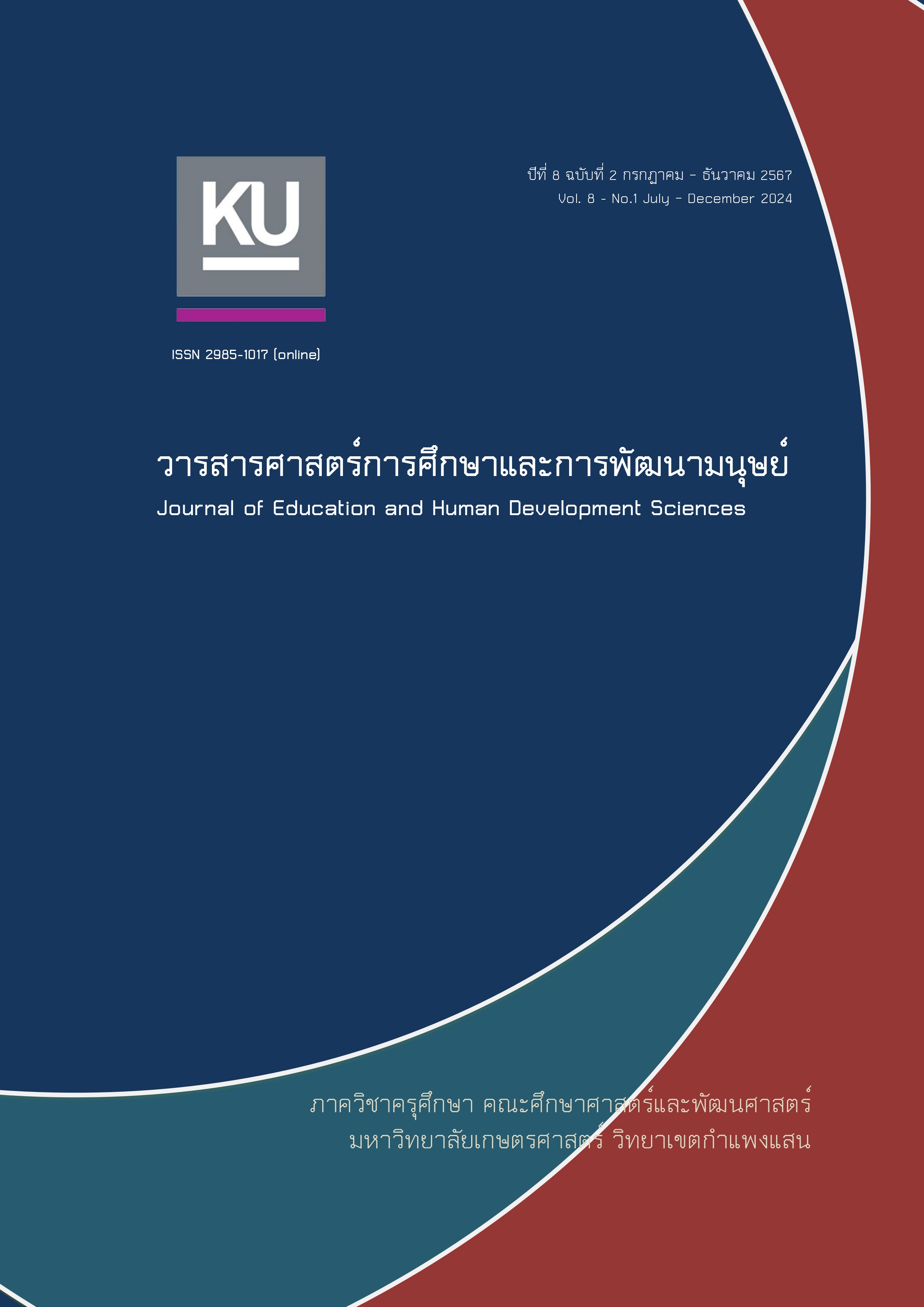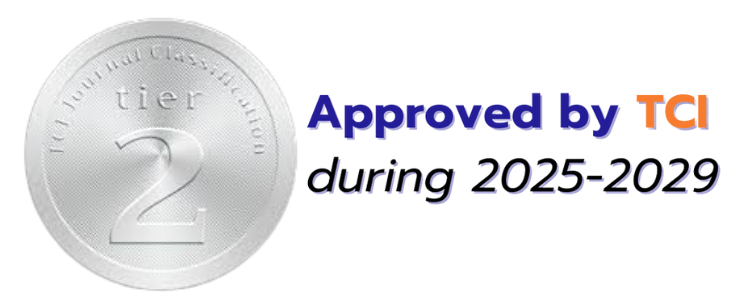การพัฒนากระบวนการฝึกทักษะการคิดอย่างมีวิจารณญาณเพื่อเสริมสร้างคุณธรรมโดยใช้หลักอริยสัจสี่ผ่านการเรียนรู้ตามทฤษฎีคอนสตรัคติวิสต์ สำหรับนักศึกษาชั้นปีที่ 1 คณะครุศาสตร์ มหาวิทยาลัยราชภัฏอุบลราชธานี
关键词:
การคิดอย่างมีวิจารณญาณ, คุณธรรม, การเสริมสร้างคุณธรรม摘要
การวิจัยครั้งนี้มีวัตถุประสงค์เพื่อ 1) พัฒนากระบวนการฝึกทักษะการคิดอย่างมีวิจารณญาณเพื่อเสริมสร้างคุณธรรม โดยใช้หลักอริยสัจสี่ ผ่านการเรียนรู้ตามทฤษฎีคอนตรัคติวิสต์ และ 2) เปรียบเทียบทักษะการคิดอย่างมีวิจารณญาณเชิงคุณธรรมระหว่างกลุ่มทดลองกับกลุ่มควบคุม หลังใช้กระบวนการฝึกทักษะการคิดอย่างมีวิจารณญาณเพื่อเสริมสร้างคุณธรรม ประชากร คือ นักศึกษาชั้นปีที่ 1 คณะครุศาสตร์ มหาวิทยาลัยราชภัฏอุบลราชธานี ปีการศึกษา 2566 จำนวน 509 คน กลุ่มตัวอย่างซึ่งได้รับการพิทักษ์สิทธิ์ ประกอบด้วย 2 กลุ่ม กลุ่มตัวอย่างที่ 1 คือ นักศึกษา จำนวน 95 คน ได้มาโดยการสุ่มอย่างง่ายเพื่อใช้สำรวจการตัดสินใจเชิงคุณธรรม และกลุ่มตัวอย่างที่ 2 คือ นักศึกษา จำนวน 40 คน ได้มาโดยการสุ่มอย่างง่ายและจับคู่เข้ากลุ่มทดลองและกลุ่มควบคุมกลุ่มละ 20 คน เพื่อใช้เปรียบเทียบทักษะการคิด เครื่องมือที่ใช้ ได้แก่ 1) แบบวัดการตัดสินใจเชิงคุณธรรม 2) ชุดกระบวนการฝึกทักษะการคิดอย่างมีวิจารณญาณเพื่อเสริมสร้างคุณธรรม และ 3) แบบวัดทักษะการคิดอย่างมีวิจารณญาณเชิงคุณธรรม การวิเคราะห์ข้อมูลใช้สถิติบรรยาย ได้แก่ ความถี่ ร้อยละ ค่าเฉลี่ย และส่วนเบี่ยงเบนมาตรฐาน และใช้สถิติอ้างอิง คือ การทดสอบที ผลการวิจัย พบว่า 1) กระบวนการฝึกทักษะการคิดอย่างมีวิจารณญาณเพื่อเสริมสร้างคุณธรรม ประกอบด้วย 4 ขั้นตอน ได้แก่ (1) ฝึกระบุปัญหา (2) ฝึกวิเคราะห์สาเหตุปัญหา (3) ฝึกกำหนดเป้าหมายการแก้ปัญหา และ (4) ฝึกแนวทางแก้ปัญหา มีทั้งหมด 11 กิจกรรม และ 2) ทักษะการคิดอย่างมีวิจารณญาณเชิงคุณธรรมของนักศึกษาที่ผ่านการใช้กระบวนการฝึกทักษะการคิดอย่างมีวิจารณญาณในกลุ่มทดลองสูงกว่ากลุ่มควบคุมอย่างมีนัยสำคัญทางสถิติที่ระดับ .05
##plugins.generic.usageStats.downloads##
参考
Anantasuk, N. & Mangkorn, M. (2020). A Study of the Results of Learning Management According to Constructivist Theory to Promote Academic Achievement in Social Studies Subjects and Satisfaction of Mathayomsuksa 4 Students. Education journal, 3(2), 40 - 49.
Anggraeny, E., & Khongput, S. (2022). Teachers’ perceptions and practices of critical thinking instruction in Indonesian senior high schools: A case study. TEFLIN Journal: A Publication on the Teaching & Learning of English, 33(1), 1 – 26. http://dx.doi.org/10.15639/teflinjournal.v33i1/1-26
Auntum, P., Kaewsiri, S., & Inthaya, Y. (2015). Problem solving thinking by four noble truths method on economics subject for prathomsuksa 6 students at watkukum school, San Patong district, Chiang Mai Province. Ganesha Journal, 11(1), 69 – 75.
Bennett, C., & Bennett, J. L. (2022). Five suggested soft skills learning objectives for enhancing undergraduate accounting curriculum. Journal of Instructional Pedagogies, 27, 1 – 14.
Ben-Shahar, T. H. (2023). Merit, opportunity, and the future of higher education. In: Sardoč, M. (eds) Handbook of Equality of Opportunity. Springer, Cham. https://doi.org/10.1007/978-3-319-52269-2_92-1
Bezjian, J., Godinez, J., Dean, B. P., & Wright, S. L. (2023). Teaching lewin's model on change management: Lessons from the cool runnings film. Journal of Instructional Pedagogies, 29, 1 – 18.
Chatfield, T. (2022). Critical thinking: Your guide to effective argument, successful analysis and independent study. London : Sage.
Dewey, J. (1910). How we think. Boston: D.C. Heath. Retrieved from https://archive.org/details/howwethink 000838mbp /page/n13/mode/2up
Ding, K.; & Li, H. (2023). Digital addiction intervention for children and adolescents: A scoping review. International Journal of Environmental Research and Public Health, 20(6), 4777. https://doi.org/ 10.3390/ijerph20064777
Duffy, T. M., & Cunningham, D. J. (1996). Constructivism: implications for the design and delivery of instruction. In D. H. Jonassen (Ed.), Handbook of Research for Educational Communications and Technology. NY: Macmillan. Retrieved from https://homepages.gac.edu/~mkoomen/edu241/ constructivism.pdf
Dung, N. T., & Nga, N. T. T. (2023). Improve the quality of ethical education for Vietnamese students today. International Journal of Advanced Multidisciplinary Research and Studies, 3(6), 1057 – 1060.
Dunn, D.S., Halonen, J.S., & Smith. R.A. (2008). Teaching critical thinking in psychology: A handbook of best practices. Wiley Blackwell. Retrieved from https://repository.poltekkes-kaltim.ac.id/1162/1/teaching- critical-thinking- in-psychology-a-handbook-of-best-practices.pdf
Ennis, R.H. (2018). Critical thinking across the curriculum: A vision. Topoi. 37,165 – 184. https://doi.org/ 10.1007/s11245-016-9401-4
Goldstein, E. B. (2011). Cognitive psychology (3rd ed.). Belmont, CA: Wadsworth. Retrieved from https://aishwaryajaiswal.com/wp-content/uploads/2022/01/Cognitive-Psychology_-Connecting-Mind-Research -and-Everyday-Experience.pdf
Isroani, F., & Huda, M. (2022). Strengthening character education through holistic learning values. Quality, 10(2), 289-306. http://dx.doi.org/10.21043/quality.v10i2.17054
Kilic, A., & Sahin, S. (2022). The effect of layered inquiry-based learning model on students' skills, values and attitudes. Journal of Instructional Research, 31, 118 – 137.
Mirzayevich, K. B. (2023). The negative impact of social networks on the spirituality of young people in the context of globalization. Open Access Repository, 4(3), 780 – 789.
Moore, G. D. (2023). Technical training and soft skills--A study of internships. Journal of Instructional Pedagogies, 28, 1 – 7.
##submission.downloads##
已出版
期
栏目
##submission.license##
##submission.copyrightStatement##
##submission.license.cc.by-nc-nd4.footer##






